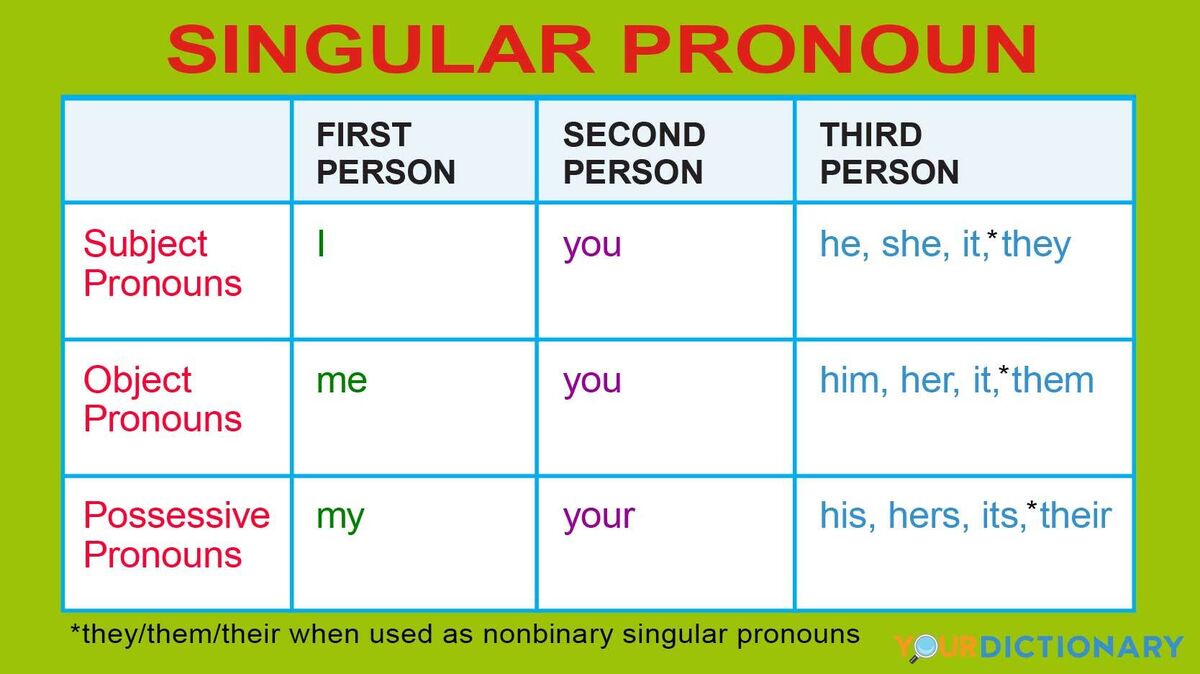
Defining a Singular Pronoun
All pronouns are words that take the place of nouns. The prefix "pro" means "for," so a pronoun is "for a noun." This allows the text to flow better and not be filled with repetitions of nouns.
Some pronouns are designed to reflect singular situations, and some reflect plural situations. Singular pronouns represent singular nouns. Any time you need to use a pronoun to replace a noun, consider whether the noun is plural or singular. If it is singular, it should be replaced with a singular pronoun.
Examples of Singular Pronouns
It is important to understand which pronouns are singular so that you are successful in using a singular pronoun when the word it is replacing in the sentence (the antecedent) is singular. Here is a singular pronouns list for each of the types of pronouns.
- subject pronouns - I, you, he, she, it, they (when used as a gender-inclusive pronoun)
- object pronouns - me, you, him, her, it, them
- possessive pronouns - my, mine, your, yours, his, her, hers, its, theirs
- interrogative pronouns - who, whom, whose, what, which
- indefinite pronouns - another, each, everything, nobody, either, someone
- relative pronouns - who, whom, whose, that, which
- reflexive and intensive pronouns - myself, yourself, himself, herself, itself
- demonstrative pronouns - this, that
Antecedents & Pronouns: Show the Relationship
A pronoun often refers back to a noun, pronoun, phrase, or clause in a sentence or sentences, and that is the pronoun's antecedent. If the antecedent is singular, the pronoun that refers back to it must be singular. This is called pronoun-antecedent agreement.

Here are some examples that show the relationship between the singular pronoun and its antecedent.
- When my friend got to the movies, she ordered a large popcorn.
- The dog escaped its owner and ran down the street.
- My mother made her famous carrot cake for my birthday.
- The phone call was from my best friend, whom I hadn’t seen in weeks.
- She was looking for a great book, so I recommended this.
Tips for Tricky Situations With Singular Pronouns
There are certain situations and some words that can be bothersome when trying to make pronouns and their antecedents agree. Keep the following tips in mind.
Ignore Other Words Between the Antecedent and Pronoun
Sometimes there are a lot of words and phrases between the antecedent and the pronoun, so you need to ignore those extra words and focus on the words that need to agree.
- My mother is running for the city council in our small town near the border, so she is making signs to advertise her candidacy.
- People were making fun of the lunchbox with the purple sparkly handle and frolicking unicorns with rainbow hair, and I was kind of embarrassed to admit that it was mine.
- When Aaron checked his email on the rainy day in March just before Easter, I was the last person he expected to hear from.
Know That Groups Can Sometimes Be Singular
Other times, the subject is referring to a group of people or things. In this case, the group is treated as singular.
- A herd of cows came into the road, where it held up traffic for an hour.
- Our team won the debate because it was the most prepared.
- When it came back from deliberations, the jury quickly found the man guilty.
A Compound Subject Sometimes Needs a Singular Pronoun
A compound subject will need a singular pronoun if the words "or" or "nor" are joining the subjects. If this is the case, the subject that is closer to the pronoun is the one the pronoun must agree with.
- The workers or the boss wanted his hours changed.
- Neither Sam nor Fred wanted to sign his name to the document.
- Neither the book nor the movie received the recognition it deserved.
Some Indefinite Pronouns Are Singular
The following indefinite pronouns are singular and, if used as antecedents, would require a singular pronoun. They are: no one, nothing, nobody, anyone, anything, anybody, someone, something, somebody, everyone, everything, everybody, one, each, either, and neither.
- Everyone should bring his own lunch on the field trip.
- Something changed, and it wasn’t the weather.
- Each girl had her own seat on the bus.
Practice Your Pronouns
Understanding the grammar rules for using singular pronouns is key to making sure the pronoun and the antecedent agree. To test your skills and get some extra practice, try some fun pronoun activities.